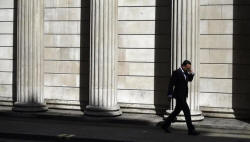|
Bank of England's chief
economist says UK needs prompt, muscular stimulus
 Send a link to a friend
Send a link to a friend
 [July 15, 2016]
By David Milliken [July 15, 2016]
By David Milliken
LONDON (Reuters) - The Bank of England
needs to act "promptly as well as muscularly" to stimulate the
economy and boost confidence, its chief economist said on Friday, a
day after the central bank upset markets by not cutting rates.
In his first speech since Britain voted last month to leave the
European Union, Andrew Haldane said the BoE needed to come up with a
"package of mutually-complementary monetary policy easing measures"
in time for a rate-setting meeting on Aug. 4.
"This monetary response, if it is to buttress expectations and
confidence, needs I think to be delivered promptly as well as
muscularly. By promptly I mean next month," he said.
Sterling fell almost a cent against the U.S. dollar <GBP=> after the
speech, reversing some of the gains made after Thursday's surprise
decision to keep rates on hold.
Investment bank J.P. Morgan changed its forecast for British
interest rates after Haldane's speech, predicting the BoE would cut
rates to zero next month, rather than to 0.25 percent.

Only one BoE policymaker, Gertjan Vlieghe, voted to cut rates this
week, but most others said looser policy was likely to be needed at
next month's Monetary Policy Committee meeting, once they had better
forecasts for the economy.
Haldane did not offer any detail on what form this loosening should
take, and whether it would go beyond the interest rate cuts and
government bond purchases the central bank pursued during and after
the global financial crisis.
More innovative measures - such as purchases of private -sector
assets or incentives for banks to lend - would need approval from
Britain's new finance minister, Philip Hammond, who replaced George
Osborne in a post-referendum reshuffle.
J.P. Morgan economist Allan Monks said he expected the BoE to buy 75
billion pounds ($100 billion) more government bonds, and either
extend its Funding for Lending Scheme, which offers banks cheap
credit, or buy corporate bonds again as it briefly did in the
financial crisis.
"This would pretty much leave the monetary cupboard bare unless
Carney overcomes his objections to negative rates. For now we do not
think that will happen," Monks said, adding he also expected Hammond
to suspend planned public spending cuts.
"SLEDGEHAMMER" TACTICS
Haldane said the central bank should err on the side of responding
too aggressively, given potential doubts about the effectiveness of
monetary policy at boosting demand when British interest rates are
already close to zero.
[to top of second column] |

A man speaks on his phone outside the Bank of England in London,
Britain July 5, 2016. REUTERS/Dylan Martinez/File Photo

"I would rather run the risk of taking a sledgehammer to crack a nut
than taking a miniature rock hammer to tunnel my way out of prison,"
he said - though he added that he would keep in mind the risks of
"ever-larger doses of the monetary medicine".
BoE Governor Mark Carney has said that - unlike the European Central
Bank - he would be unwilling to cut interest rates below zero
because of the damage it would do to banks' profits and ability to
lend.
Carney has also said the central bank would be unable to fully
offset the economic damage from leaving the EU, and that while it
could influence the supply and price of lending, there was less it
could do to affect demand.
Haldane said Britain's economy could slow materially in the coming
quarters, but he did not see a crash.
"While the past few weeks have been a drama, there is no reason to
expect this to turn into a crisis, or at least a financial one," he
said.
Businesses were more likely to "trim and singe" rather than "slash
and burn" hiring and investment plans, he added.
Sterling's sharp fall since the EU vote meant it was possible
consumer price inflation - just 0.3 percent in May - could overshoot
the central bank's 2 percent target in the foreseeable future,
Haldane said.

But broader economic weakness meant big price rises were unlikely to
become entrenched, he added.
($1 = 0.7480 pounds)
(Editing by Jeremy Gaunt)
[© 2016 Thomson Reuters. All rights
reserved.] Copyright 2016 Reuters. All rights reserved. This material may not be published,
broadcast, rewritten or redistributed. |